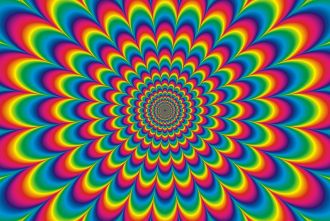
Higher doses of LSD can alleviate the symptoms of moderate to severe anxiety disorder
It may sound counterintuitive, but US scientists say taking the psychedelic drug LSD (lysergic acid diethylamide) appears to help alleviate the symptoms of moderate to severe generalised anxiety disorder (GAD), with higher doses more effective than lower doses. The team ran a 'gold standard' clinical trial including 198 people with GAD, who were given one of four different doses of a drug called MM120 (lysergide D-tartrate) - a pharmaceutical form of LSD that can be taken orally - or an inactive treatment for comparison. Their anxiety symptoms were assessed before and after the single-dose treatment in a controlled environment. Analysing the results, the researchers found no difference in symptoms among patients given the lowest doses of 25 or 50 micrograms, but improvements were seen in those given 100 or 200 micrograms. The most common side effects were, unsurprisingly, visual hallucinations, followed by nausea and headache, but nobody appears to have suffered a 'bad trip'. The scientists say their results support further investigation of higher-dose LSD for the treatment of GAD.
The study, considered a "gold standard" trial due to its robust methodology, involved 198 participants diagnosed with GAD. These individuals were carefully administered a single dose of MM120 (lysergide D-tartrate), a pharmaceutical grade form of LSD designed for oral consumption. Participants were divided into groups receiving varying doses: 25 micrograms, 50 micrograms, 100 micrograms, or 200 micrograms. A control group received an inactive placebo for comparison.
Prior to and following the single-dose treatment, participants' anxiety symptoms were meticulously assessed within a controlled environment. Analysis of the data revealed a crucial finding: lower doses of 25 or 50 micrograms showed no significant impact on anxiety symptoms. However, those receiving 100 or 200 micrograms experienced noticeable improvements. This suggests a dose-dependent relationship, with higher doses proving more effective in reducing anxiety.
While the results are promising, the researchers acknowledge the inherent risks associated with LSD. The most frequently reported side effects were visual hallucinations, followed by nausea and headache. Importantly, the study reported that no participant experienced a severely negative psychological reaction, often referred to as a "bad trip." The controlled environment and careful monitoring likely contributed to this positive outcome.
The scientists emphasize that these findings are preliminary and warrant further investigation. They believe the results strongly support the exploration of higher-dose LSD as a potential therapeutic intervention for GAD. Further research is needed to fully understand the long-term effects, optimal dosage strategies, and identify individuals who might benefit most from this novel approach to anxiety treatment. The study opens a new avenue for exploring the therapeutic potential of psychedelic substances under strict medical supervision.